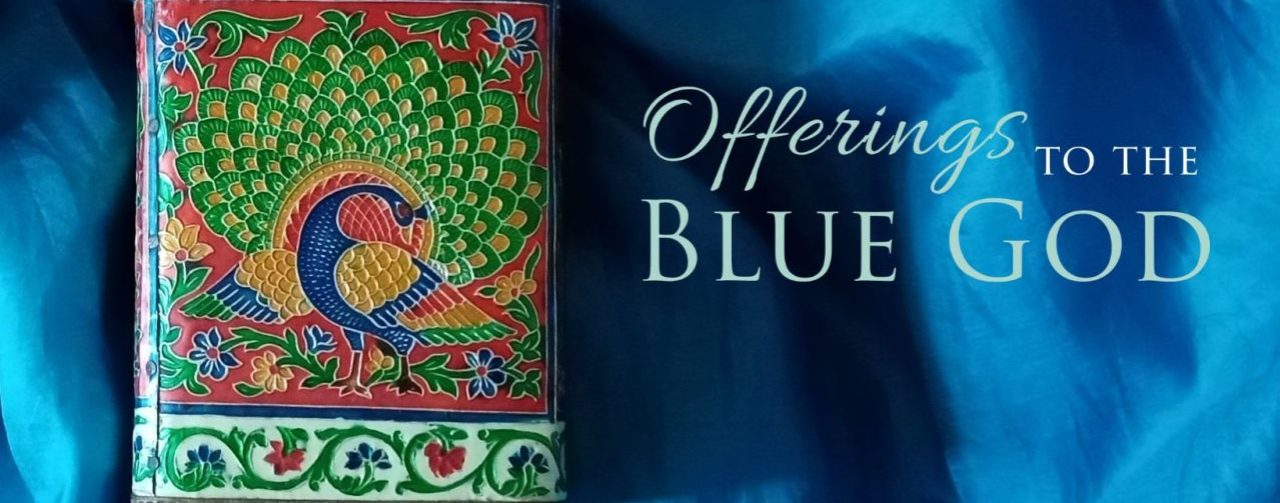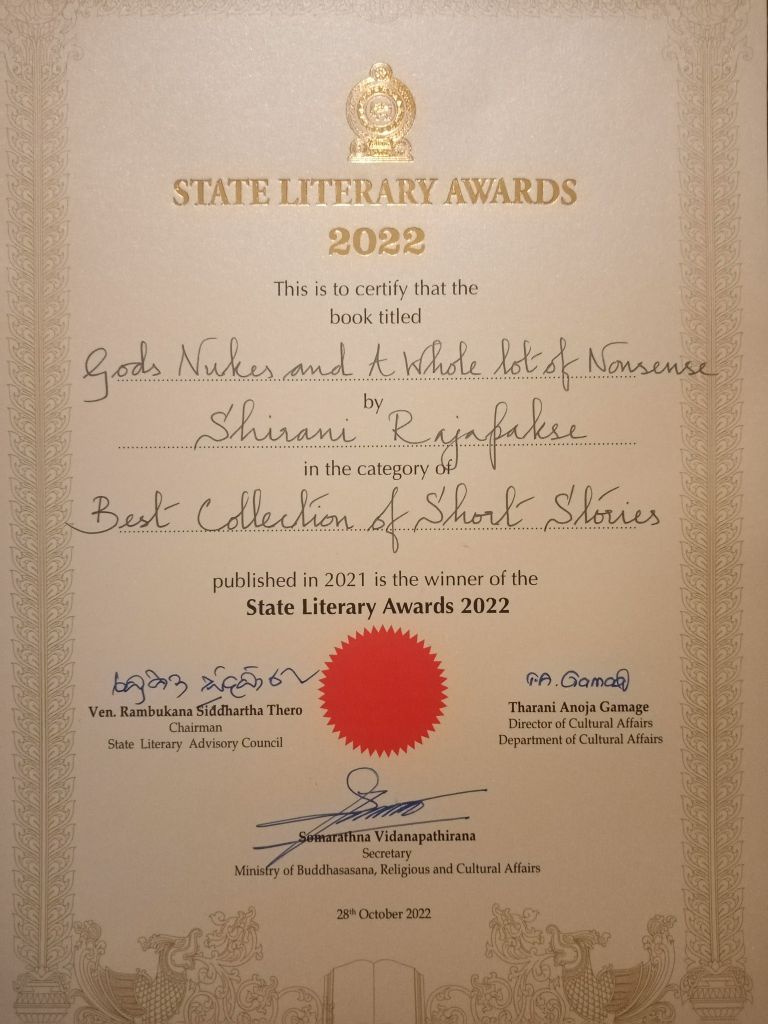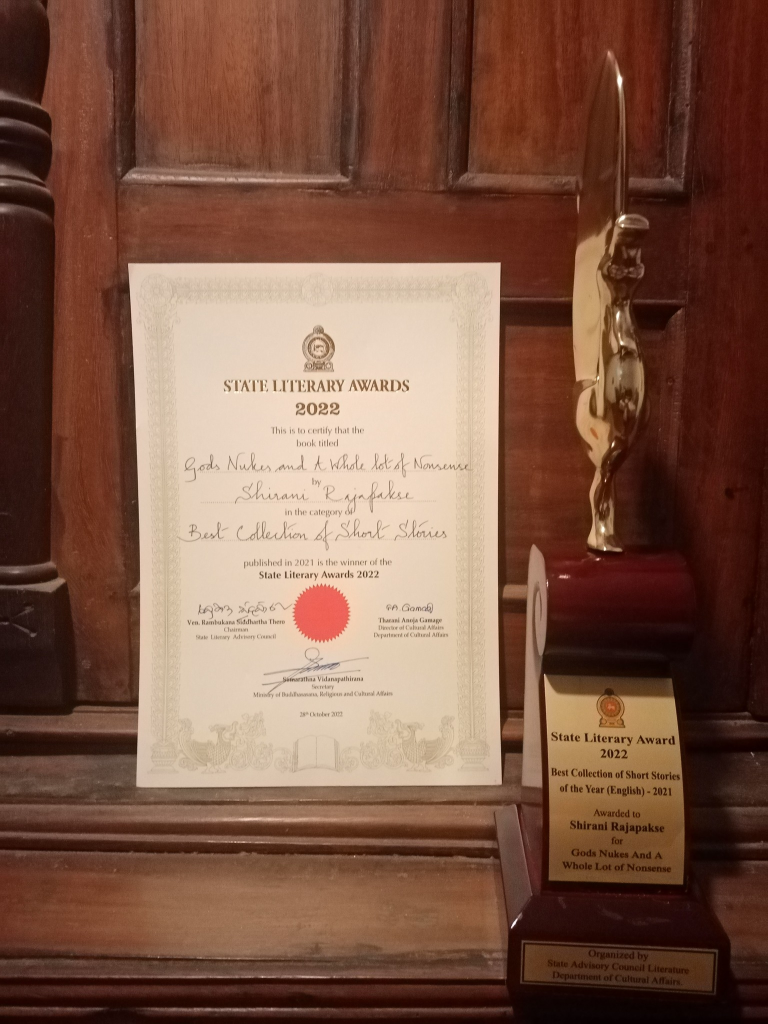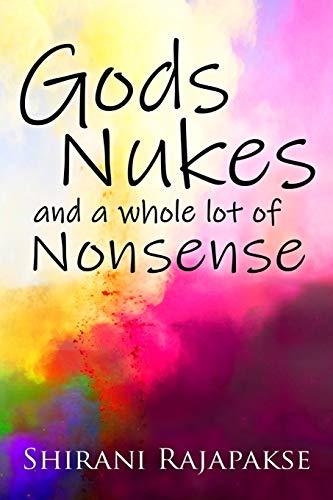Happy to have work included in Anam’s second edition. Thanks to Manu Dash and MK Ajay for selecting my work.


Three poems from Chant of a Million Women were published in Outlook India on October 21, 2023. The poems are about the women in the epic story Ramayana. Fault Lines is a two-voice poem between Sita and a modern woman, A Princess Wronged is Suparnaka’s version of history, and Lines of Control references both of them as well as other famous and not so famous women in history. The poems add to the dialogue on the women of the Ramayana and beyond. Go here or read them below.

Fault Lines
The lines on my hand
recount a story I can’t hide from you.
Sita stepped over the line.
Fortune visits those blessed to
lead the kind of life they desire.
She didn’t want to be restricted.
My life stretches before me a
long and winding road that
meanders through emerald
woods, ascends cliffs and floats
along streams rushing to wherever.
Fate intersects,
but I stand strong.
She was fed up, not
what she had agreed when they met.
Who was to say
the lines weren’t drawn to wander
on her palms?
Maybe they read it
and remained silent because they
couldn’t change destiny.
She was a woman
and had to be confined.
My lines travel the world, crisscross
continents,
scale mountains
to lose themselves in valleys deep.
She stepped out for
some fresh air.
I reap my own rewards.
She
was looking for adventure, a new life.
I pick
my path even if it is
wrought with fear and pain. Striding
with head held up, high heels
tapping my beat
to melodies only I want to sing.
What stood in front of her
was better than what she was
leaving behind.
I had an education, a job,
money at hand. I could do as I pleased.
They changed
the story. Said he
abducted her.
Said
she was
out
of
line.
I didn’t want him, ineffective.
He would bring me down to his level, a
worm slithering in the
damp undergrowth afraid
of the light.
Her strength.
His weakness to protect her.
I sent him away. I could do better
than that.
His shame took kingdoms to war.
Millions died, but those lives didn’t
matter; non essentials, expendable.
I refused to answer his call.
He pleaded
like
an
ant.
He dragged her
back, his trophy, his possession.
She insulted his authority.
I’m no one’s
treasure. Not a prize won at
a game not a plaque to
hang
on
the wall.
She wanted something more
than what she was getting.
I concur. Totally agree.
She was condemned.
I have an option.
She wasn’t given her preference.
She walked into flames, red hot she
rose. They still wonder.
Can’t make up their minds.
Can’t call him
a fool. Not after so long.
The narrative remains the way he wrote it.
They look on silently at my attempts
to rule my universe.
I stand strong.
A Princess Wronged
Easier for you,
flinging negative comments.
Making up stories, telling tales, dictating
the course of history the way you wanted.
They all believed the lie. I was ugly, you said.
Very ugly, you laughed to the trees
and the thunder grumbled, annoyed.
What difference did it make
if I was mutilated?
You cackled to winds.
You had authority. You had the scribes
falling at your feet waiting to
lap up words
gushing out your lips.
You made sure they recorded your views.
Not mine.
Never mine.
They weren’t there. They didn’t see.
Never knew me.
Only heard your words much later.
Did you stop to ask folks in the towns
we passed if they thought the same?
Could eyes be so deceiving everywhere?
But your words held sway.
Your truth had to do.
Their eyes were blinded with threats,
fear of fools that ruled.
It was the only way you could
start a war, coward that you were.
Get my brother to attack first, say it was his
fault, say he was vile, uncontrollable, lustful,
sinful, everything deceitful.
But I know,
your desire for me
destroyed my looks.
You couldn’t bear to not have what
you wanted.
No control. Left your wife at home alone.
Staring at her sister every day,
your brother’s wife.
You couldn’t have her.
Such a sad example for a man.
When I laughed in your face, rejecting
the ineffective thing in front of me, the puny
man not even the deer in the woods
took notice of,
that was the last straw.
Out roared your fury.
Your sword. My nose.
I didn’t deserve punishment, banishment
thrown out of my house, reviled by
the times to come.
I endured it all.
Through the ages my name rang
true peeling off the layers of lies,
and the future will learn.
Someday they will know.
I was beautiful.
Lines of Control
Refusing to be confined by
an invisible line, she crossed over to
the other side.
Oh the pleasure of decision making,
empowering for a woman forced
inside a house
detained in
an indiscernible circle drawn
by a man who had no respect for women.
Why else would he chop off
her nose and bring forth the wrath of
her brother?
She had enough of these fools that
called themselves men.
She reached the end of her tether
and wanted out. He was waiting
with his plane.
A flight plan already mapped out.
She was free, but only for a few blissful days.
He came to collect his looted treasure.
Another century
another place
she was acquired again, and again
the owner marched in to seize control.
Wars were fought.
Sita and Helen they both
wanted out,
out of the unpleasantness they were forced
to lead that wasn’t life, but
paid the ultimate price
for freedom and love.
Independence demanded
the ultimatum—she walked through fire,
but it wasn’t enough. He threw her away.
She grew old with despair.
Too many lives lost in vain.
The thousand ships sailed away.
Draupadi was pawned in a game of dice.
Srija was left in the drain.
Nirbhaya torn apart
and thrown out like trash.
Someone with a forgotten name was sacrificed
on the altar of commerce.
Little girls from a poor country sold as slaves.
Their bodies could warm gnarled old men.
Innocence stolen for adult pleasures.
Money spoke, eloquent like wine.
Children, always the children
forced to pay.
Everyday someone was ground in the dust.
The hands of the woman holding the scales
trembled with fury at the injustice,
but no one could take off the blindfold.
Aphrodite stood helpless to defend
without her arms.
But arms can do only so much.
The lines kept getting longer.
No one cared.
Remember how Magdalene
was condemned by
the old men seeking to make a
name for themselves?
Couldn’t bear the thought that she
was better, more intelligent than they were,
or that she was the chosen one
from all his crowd.
A woman selected to carry on his message.
How could that be?
Joan’s voices were damning the men
they didn’t like the attention
she was getting.
Too much publicity for a mere village girl.
She had the Dauphin in her hand.
They wanted him dancing to their tune.
She thwarted their plans.
The stakes were too high. She had to go.
No one survives a fire.
It was easier to call her a witch,
dangerous,
might do strange things to the children.
They were out of line,
all of them. Had to be brought under control.
Of the men.
Gods, Nukes and a whole lot of Nonsense won the State Literary Awards 2022 for the best collection of short stories published in 2021. The awards ceremony was held yesterday, October 28, 2022.


This just in. Gods, Nukes and a whole lot of Nonsense is nominated for a State Literary Award 2022 in the short story category.



Members of the English Literary Association (ELA) of Faculty of Medical Sciences, University of Sri Jayawardenepura, recently reviewed all my books. This is the review for I Exist. Therefore I Am.
First of all, reading this book synced with the time very well as Talibans have taken over Afghanistan and taken away every right a woman owns. One could say that this book is deeply feminist and one could say those stories are fictional. But the author hasn’t just stated about the injustice that women face in India each and every day. She has been able to find the deep roots of the society and culture that give rise to the problems.
That’s the beauty of these short stories. Except for the story of Arti, I didn’t feel a huge fury about the assailant (I couldn’t sympathize with Arti’s mother-in-law). In most of the stories, there were clear victims and assailants but author always proves us that all of them are victims of an ill society.
I exist, therefore I am was one of my favorites because it talks about abortion. Those stories are not just relevant to India. Injustice prevails in every society, more or less. Even we are facing an abortion ban in our country and people are expressing different opinions. The baby loses her life simply because she was a girl. But what unborn baby asks from her mother is important. “How did you survive the abortion when you are of the same gender?” It shows how bullied become bullies. Although they have gone through all the pain of surviving as a woman, mother-in-laws are the ones who curse the daughter-in-law for not bearing sons. So this story asks big questions. Is the patriarchal society clearly a man-dominated system or something that’s maintained by women themselves?
I personally loved the story of Shwetha, also. This story is pretty much relevant to any part of the world. Shwetha was a woman rights activist but even she couldn’t break the wall. Throughout the story I was searching for the reason why she had to marry this old man? Author doesn’t directly say what happened. She gives us clues but doesn’t give a clear answer but that makes the story far more interesting. Was it because she was raped by this man? Was it because of her blind faith on this man? Was it purely love? Did he really blackmail her? Shwetha was a wonderful depiction of thousands of women who would sacrifice their lives for their beloved husbands. She was the voice of thousand of women yet she couldn’t speak up for herself. It’s easier to ask others to free themselves but it’s hard to break the walls of the prisons we build on our own.
Her big day was fast approaching captured my heart instantly. It was not a mere story about how insane amount of money, weddings cost. It also reviews the question of dowry and this made me understand why people altogether hated having a baby girl. She was a financial burden. Only rich could fulfill the insanely high hopes and wishes of the in-laws. And it also talks about how a woman become lost. A woman gets dual citizenship in two families and while her own family thinks that she’s now owned to a new family after the marriage and her in-laws treats her as the stranger. She become a stranger owned by everybody and nobody.
Dowry is an old concept which is still prevalent in Sri Lanka and women should be financially independent to supply for herself. Why does she even needs an education if that serves only as a qualification to find a husband? This story has a wonderful storytelling because her parents weren’t villains. Her father tried to give the best to his family although he has to live under the constant pressure of loans, finances and also bearing the the war between his mother and wife.
Dowry was initiated as a way of maintaining the girl’s financial independence in the medieval times. Now it’s a thing that creates a huge burden on poor families who can’t even provide for their families. It also mocks the characters that although they think that they are very modern they still thinks biding to their rotten social norms. Can we really blame the mothers who perform infanticide as way of mercy-killing?
Secrets reminded me of Handmaid’s tale of Margaret Atwood. Women lose the power of owning property in Atwood’s fictional world. They call it as a dystopian novel while in the suburbs of India, Afghanistan, Pakistan and even in Sri Lanka women lose their power over property.
Although western world is sweeping with ideas of third wave of feminism it’s pathetic that countries like India, Middle East, Afghanistan and so many countries I couldn’t mention, still haven’t even had the chance of going through the first wave of feminism. Last but not least, these stories are not just Indian stories. Either it’s domestic violence, abortion, elder abuse or infanticide, those are still happening in front our eyes although we prefer to stay blind. Patriarchal society is not equivalent to male domineering. It’s not just the society’s fault it’s also the women’s fault of not questioning and trying and at least not trying to rebel against the society by secretly opening a bank account. Attitudes should change and Shirani Rajapakshe has done an excellent job of influencing her fellow womenkind.
Members of the English Literary Association (ELA) of Faculty of Medical Sciences, University of Sri Jayawardenepura, recently reviewed all my books. This is the review for Gods, Nukes and a Whole Lot of Nonsense.
God’s Nukes and a whole lot of nonsense is a collection of short stories written by Shirani Rajapakse. A literary snapshot of Indian culture and way of life, it addresses common social issues and gives a peek into the mindset of some truly relatable characters.
A plethora of themes are discussed in this collection of short stories. Perhaps the most prominent of them and the most commonly portrayed is the self importance, ego, and conceitedness shown by the protagonists. The characters of Ram Pratap Sharma and the Postcard Swami are overwhelmingly egoistic, prepared to do anything to uphold their own image, often through pretence and false facade. This shines light on the particular social evil of greed, and the resulting corruption brought on by trying to satisfy one’s own ego.
Conservative Indian thought is bountiful in most, if not all the short stories. The characters are largely ignorant of the outside world, and with that ignorance comes a general hatred of the west and cultures they are not familiar with. Specific instances bring this theme out exceptionally, including the way the Swamis at the Mandir refer to tourists as ‘White Trash’, ‘White Face’, and the ‘Stingy Japanese’. Offensive humour to say the least, but the reality is obvious. An exception can be made with the character of Krishna in Meeting God, but then again even he is shown to be seeking a conservative Indian woman back home rather than settle with the largely progressive, liberal women of New York.
The concept of Indian Marriage is also touched on, as shown in this extract from ‘Prophet of the Thar’:
“The horoscopes didn’t match, the dowry wasn’t big enough, The girl wasn’t pretty enough. There were many things to consider before selecting a bride for Ram Lal and the family she would enter.”
The same story also reflects on the theme of Changes and Conflict, as evident in the lines “He was tired of being in the village and wanted to explore the land”.
Insight on an outsider’s perspective of India is well brought out in stories such as Postcard Swami, The Great Indian Itch, and In Search of a Miracle. What’s worth noting is the similar ignorance of the west towards the east, just as the conservative Indian is oblivious to the west. The tourists are shown to know nothing about India, despite choosing to visit the country. This is explicitly shown in the lines “Some of the foreigners that wondered in had that ‘just got off a plane’ look on their faces. They strolled into the mandir with absolutely no idea about anything that was Indian, except that they were now in India. They didn’t know what to expect and were duped just about every corner they turned” in the story Postcard Swami.
Shirani also reveals the wide meaning of life. What is the actual purpose of the journey of life? This makes the readers wonder what the true meaning of life is as in the extract “In Search of a Miracle”. She also shows that the genuine mindset of people deep inside, are still the same except for the outer development that had occurred.
It takes a single sentence like “I met God the other day” (Meeting God) or, “Aum Namaha Shivaya” (Gods, Nukes and a whole lot of Nonsense) to capture the readers’ attention and set the mood. They are transported to the mundane Indian livelihood where the stories are not exaggerated but derived from the raw experiences. The author’s literary talents have the magical ability of conjuring a short movie with a plot that’s relatable on many levels.
All the short stories in this collection are set in Indian society and unfold around the lives of the localers.Whether it be in a desert , a small village, or a town, the environment builds on Indian culture. The milieu is strikingly similar to that found in Sri Lanka, owing to the fact that both countries have similar cultural roots. Particular use of traditionally Indian words and Hindu mantras bring about the setting without being overwhelming, while there is a real sense-of-place in the stories.
The style of writing employed by the author is comprehensive and descriptive. So, even if the readers are not too familiar with the settings of the stories, they could effortlessly immerse themselves in them with the vivid descriptions of the environment and the scenes. A simple and understandable language is used throughout. In addition, Shirani has managed to insert and nicely handle some techniques to add a special flavour to the stories. She uses symbolism, flashbacks and repetition to emphasize on the themes . Also, she uses eye-dialect, like in the short story ‘’The Consultant’’, where she mentions ‘’ dizeez’’ , to showcase the Indian accent. The author’s occasional use of a common Indian vocabulary like “The food’s not too bad, yaar.” (Meeting God) and the humorous,sarcastic tone adds an additional beauty to the stories.
Although Gods, Nukes and a whole lot of Nonsense is in Indian context, the shared cultural origins brings this short story series a lot closer to every Sri Lankan’s heart. The themes incorporated, makes it relevant globally, shedding light on the social segregation between the west and the east. The conservative Indian lifestyle exposed by these stories is sure to make its contribution in bridging this gap. “The walls were adorned with beautiful calligraphy. Aamir loved to walk around reading the sayings carved into the stone many centuries ago.” from Aamir is relatable to all regardless of their religions. Shirani shrewdly incorporates this to show how connected people are beyond social separations.The author’s efforts to show the impact of the cultural practices using different age groups is admirable.
Shirani has conveyed the encouraging as well as unhelpful sides of India through her fictitious characters. The description about each of their dwellings in the stories brings the reader closer to the characters. “The towns and villages changed, but life remained the same everywhere.”
This sentence in one of her extracts ‘In Search of a Miracle’ perfectly portrays the realities of life which all of us are able to relate to. Each character speaks human nature filled with ego, inconsistency, fear, and spiritualism.
The story “Gods, Nukes and a whole lot of Nonsense” draws a devastating portrait of India, pools of unpleasant, ancient patriarchy swirling menacingly just beneath the tides of daily life.
Character buildup is strong, and each main character is described well both on their appearance as well as their personality and the thought processes that occur inside their head, a direct consequence of which is their actions. We see what the Swamis think of the tourists, what Ram Pratap Sharma thinks of his superiors and of himself through these exceedingly personal descriptions of the characters.
The genuine stories Rajapakse gifted through this book is bound to live within the reader’s fondest memories.
Written by
Shahini Liyanagama
Priyenkan Sritharan
Dinali Ginigaddara
Thuvaraga Thusyanthan
Members of the English Literary Association (ELA) of Faculty of Medical Sciences, University of Sri Jayawardenepura, recently reviewed all my books. I will start by sharing the review for Chant of a Million Women.
A Review – ‘Chant of a Million Women’ by Shirani Rajapakse
Shirani Rajapakse’s collection of poems in the book titled “Chant of a Million Women” revolves around the themes of gender inequality, harassment and social conflicts faced by women and the poetess has effectively captured the voices of countless silenced victims in all walks of life. It is unfortunate how struggles of women are much discussed yet seldom heard. The poetess’ attempt to bring out these unheard topics to a visible platform via poetry should indeed be applauded.
Feminism and gender equality have surprisingly become socially tabooed topics even in the current so-called ‘developed’ world. The poetess obviously has a well defined idea about feminism, which is all genders having equal rights and opportunities..
The effort taken by the poetess in wording so many trodden down voices of women in front of the injustices they face due to their gender, is quite admirable. She brings out the silent yet strong voice of those who feel suppressed, mocked at, or frowned upon at some point of their lives just and only because of their gender.
Through her compelling writing style she gives voice to the silenced, oppressed and unheard voices or as in her words ‘chants’ of women. From 5 year olds to educated professionals regardless of their profession, educational levels or even social background the poetess brings light upon the fact that sexual, emotional and physical mistreatment is rampant. Her poems involving characters like the women in Sigiriya paintings, Sita, Suparnakha, Draupadi reveal how the women of ancient times too were women with the same fears and thinking of a female mind, relatable to women even in the 21st century. The ironical fact about this is that even in today’s ‘modern’ day and age, we women still fight to be appreciated, valued and known for our intellects and abilities more than our physical appearances.
It is scary and daunting to think that at a café’, at university, on the streets and inside one’s own home and room a woman is not safe of being taken advantage of. The sad reality is that once a woman is raped or abused, she is never the same person again. She is wounded deeply with scars that do not heal over time and Rajapakse’s words portray the pain and suffering of such victims.
Her fight against all the injustice faced by women is beautifully combined with the natural poetic skills and many poetic techniques including using the most applicable symbolism, irony, personification and free verse writing style. These poems are not just free verse but also free thoughts and free illustrations about the much unpopular and ignored topics which should be major topics in discussion. The way she brings out a certain scenario and emphasise the sensitivity and conflicts combined with it is really admirable. She also uses the brilliant technique of giving the readers the opportunity of deciding instead of sticking to her view about a particular subject and by that she has become more successful in conveying the idea of the poem more efficiently without directly offending any individual but making them to take those views into consideration. The titles of her poems are catchy such as ‘Goddess in Chains’, ‘Chant of a Million Women’, ‘The Closet Rapist’ which capture the reader’s attention and keep them captivated.
Through a series of eye opening verses, her writing pulls at the female reader’s heartstrings and stirs a feeling of sisterhood and empathy for one another because we are all vulnerable and susceptible to the trauma that was inflicted on one of our own. Even for a male, he is forced to swallow the bitter pill that most of his gender are the abusers and rapists who violate a female’s body, mind and soul.
These empowering words taken from Rajapakse’s poem ‘Earth Song’ leave an imprint that within every woman lies strength, love and they are the equal halves of their male counterparts.
This review by Natalie Wood was published on June 13, 2021. You can read it at alwayswriteagain, PerfectlyWellRead and in Goodreads or see below.
A fellow reviewer of this collection notes the author’s fine poetic voice.
She is also wickedly funny!

The semi-fictional universe of **Gods, Nukes and a Whole Lot of Nonsense teems with male fraudsters: deceitful mystics; unholy, rapacious beggars; oversexed street food vendors; conniving civil servants – and even an apparent real-life divinity who disappears most disappointingly during a plane journey somewhere into the ether.
The cited characters above are non-Jews. But perhaps Shirani Rajapakse invited me to read this, her latest batch of stories, not only because she includes a jolly, cacophonous band of visiting Israeli musicians but also because Jewish Indians in Israel would recognise their western counterparts at every hallowed and so lucrative tourist spot they may name.
Rajapakse and I are acquainted only online. So I am unsure whether she is a stern political feminist, an unrepentant misandrist – or just a natural cynic.
Never mind!

Here she draws a devastating portrait of an India – where like Israel – pools of an unpleasant, ancient patriarchy swirl menacingly just beneath the tides of daily life.
**Gods, Nukes and a Whole Lot of Nonsense is available from Amazon on Kindle ($8.99) and Paperback ($15.99).
© Natalie Wood (13 June 2021)
Gods, Nukes and a Whole Lot of Nonsense was reviewed by Gordon A. Long on Renaissance Writer on May 2, 2021. You can read it directly at the link or check it out below.
When you read these stories, you know they were written by a poet. I was immediately captivated by the settings, described in minute detail: shape, colour, sound and smell. Next I was drawn in by the characters. The intricate details of their lives and their families, friends and fellow workers. Finally, though, it is this author’s compassionate portrayal of the mental experiences of her characters that fascinates the reader. External plot is secondary; the real event in each tale is the development of a new personal theme in the life of the main character.
Perhaps the most meaningful story to the Western reader would be “In Search of a Miracle,” which chronicles in great detail the experiences and reactions of a young American student on a multi-day train ordeal to Varanasi, one of the holiest cities in India. Nothing really happens. She takes the train there, she walks around, she returns to Delhi. But what is remarkable is how the mood of the story echoes her mood as she progresses through the experience. As her reaction to her environment changes, there is a palpable change in the writing to create a different atmosphere to match, allowing us to feel that we are taking part.
“The Postcard Swami” — from the story of the same name — calls himself the face of India. This book is the picture of India, from the noise, brilliance, and odours into the minds and souls of the people.
I have reviewed this writer before, and it is a tribute to her skill that this book, with so different an objective from that other work, uses a whole different set of techniques to achieve its goal.
Highly recommended for fans of poetic writing of all sorts. (5 / 5)
(5 / 5)
My third collection of short stories, Gods, Nukes and a Whole lot of Nonsense is now available in paperback and as an ebook at Amazon, Kobo, Barnes & Noble and many other sites.
Synopsis
A young village boy’s dream of leaving the village becomes a reality when he is mistaken for a Prophet. Bored at being at home after retiring, an administrative officer tries to find ways to regain his lost social status while making a quick earning. A devout old man prays at the Ganges as the world wakes up to a nuclear India. The fortunes of a fake Sadhu changes when someone uses his image on a postcard. A young women meets God in the most unlikely of places, but loses him when she falls asleep. An unusual sight greets three travel buddies as they gaze out onto a street from inside a hotel lobby. Walking through the narrow streets of an old city a young man seeks solitude in a place of worship. A man in search of popularity and fame becomes a consultant with hopes of acceptance among scholars. A young woman takes the train to Varanasi, tracing the footsteps of many who have made the similar journey. Does she find what she was looking for?
These nine stories are all about travel, physical, spiritual and imaginative, and are set in India. The stories retrace the steps of travelers that have made long journeys to sacred places, of journeys of hope and longing to be reunited with family or to connect more closely with God, as well as an individual’s journey to create a persona to show to the world.
Imaginative, contemplative and funny these stories speak of human nature and the connections we have to one another, irrespective of color, race, religion or where we come from.

You must be logged in to post a comment.